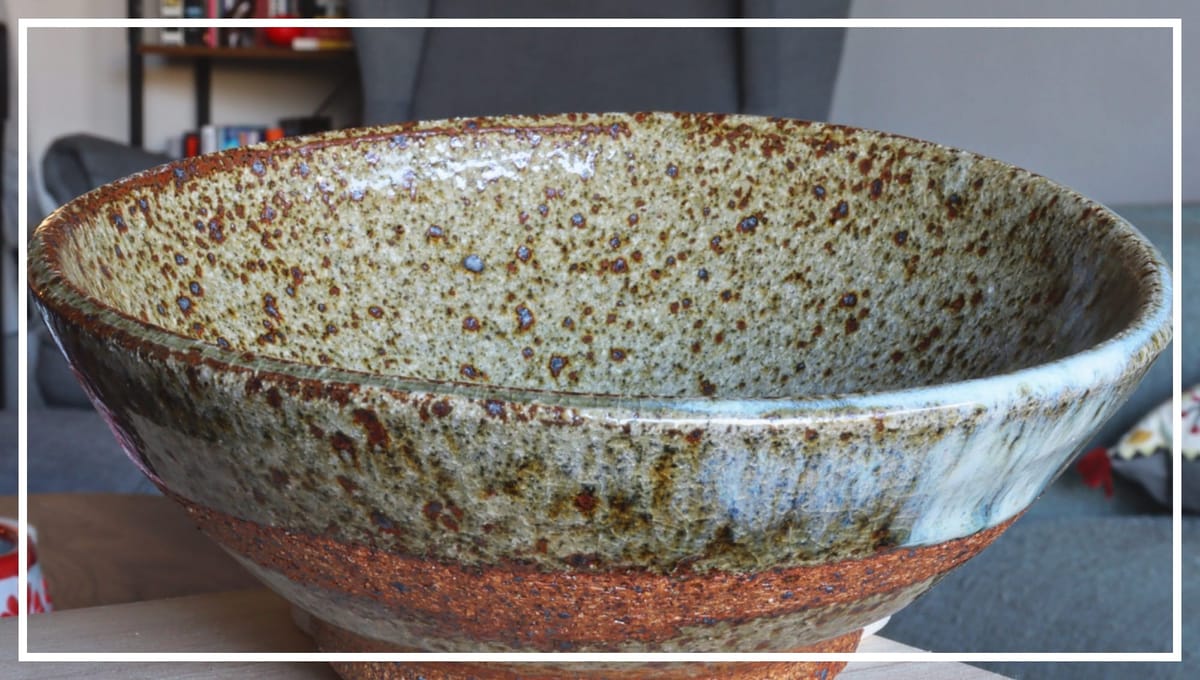Glazing and Labor

Glazing is a lot of people’s least favorite part of ceramics. And I think I sympathize. For production potters, it’s a pretty high-stakes part of the process. With a single mistake, you can ruin a pot, and that’s really terrifying. Not only because it’s really disappointing, but it makes you lose out on something you can sell. In a more abstract (perhaps belabored) way, I think glazing makes people acknowledge the end of a pot’s growth, and this can be bittersweet. No wonder people are less than thrilled to start glazing a pot.
When I glaze, I can’t help but think about the concept of labor. The act of glazing unites the hours of work that went into each piece: both the concrete work that went into shaping the form, trimming and handling. and the less tangible work like thinking of glaze combinations, organizing a vessel database, and posting on social media. Even though they look very different, all of these acts are still labor. I can’t help but think that glazing is the thread that connects all of the other steps. Glazing a pot is the act of acknowledging your labor.
I’m a bioengineer at a university. In science and engineering, the scope of most research projects is immense. There is simply too much to do to have a hand in every part of the process. So we outsource a lot of our work. This means I do lab work with reagents made for me, develop software with packages written by someone else, send my samples to another university for them to analyze. A lot of my labor is abstracted from the parts I use, which are often abstracted even further from the raw materials. It can sometimes be disheartening to know that the work I do is dwarfed by all the work that’s lined up behind me allowing me to do my research.
I hope it doesn’t sound like I’m unhappy — I love my job. I can’t think of another place where I’d have quite as much intellectual freedom. But sometimes I find myself reinventing the wheel just to remind myself that I can. I do something the hard way to see if I still have the skillset and the grit to learn and do hard things. I think the freedom to try new things is the reason I’m still an academic. Still, during the workday, it takes effort to feel connected to my labor.
That connection comes naturally when I make pottery. Ceramics is the place where I feel closest to my labor. I wedge my clay by hand, even though I’m not particularly good at it. I throw my pots with a mediocre success rate. I clean up my work surfaces to make sure none of my clay gets into someone else’s. Sometimes, pots I’m trimming fly off the wheel when I press too hard. I dry my greenware too fast and it splits down the middle. Despite all these mistakes, mistakes that I make almost daily, and the frustration of losing a pot you’ve worked so hard on, I can’t get enough. And I think that’s because I have stake in the act of creation.
I do my ceramics at a community studio. I’m currently just taking six week classes so I can learn as much as I can. I have studio time during operating hours and I have the freedom to make whatever I want. I have so much done for me at the studio — glazes are made in large batches, kilns are fired on a set schedule, I have access to throwing water and tools that make my time easier.
In some ways, this mirrors the challenges I talked about before. There are so many steps that are still abstracted from me. I can't load my pieces in the kiln, and there are clays and glazes that are off limits to me. Because of these limitations, it’s hard to connect to every aspect of the ceramics process. I would love to spend a day reduction firing my pots, turning dials, closing dampers, monitoring heatwork. I would love to spend time mixing my own strange glazes from obscure tomes I find on dusty bookstore shelves. Even when I join as a full member and get access to mid-range clays and glazes, I will still be far from having a hand in the entire making process.
I think there’s a difference between my day job and my ceramics work, though. When I make pottery, the labor is only part of the whole. The other part, to me, is the community of other potters and ceramicists who are also in their own way working towards their goals. We share the same equipment, we use the same clay, and share in each other’s joy and sorrow. I think that’s what makes working in a community studio so wonderful: there are skilled studio technicians who I trust to handle my greenware, bisque-fired and glaze-fired pieces. They are always willing to answer my questions about things that, as a new potter, I just don’t know. Their labor enriches mine, and I hope somehow mine enriches theirs.

